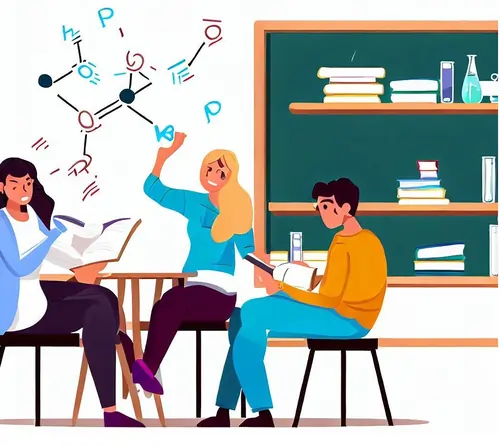- Have a Diverse Group Composition
- Have Clear Goals and Objectives
- Effective Time Management
- Ensure Active Participation
- Share Resources Among Group Members
- Summarize and Teach
- Problem-Solving Sessions
- Utilize Online Tools and Resources
- Break Down Complex Concepts
- Have Regular Review Sessions
- Peer Evaluation
- Utilize Online Forums and Communities
Chemistry is a fascinating subject that offers valuable insights into the composition and behavior of matter. However, it's also known for its complexity, requiring students to grasp intricate concepts and equations. One effective way to tackle the challenges of chemistry is by forming study groups. Study groups can provide a supportive environment for learning, clarify doubts, and enhance your understanding of the subject. In this blog, we will explore various strategies and tips on how to make chemistry study groups more effective in helping you complete your chemistry exam.
Having a diverse group composition in your chemistry study group is paramount for several reasons. First, it brings together individuals with different strengths and weaknesses, creating a dynamic learning environment. Some members may excel in certain topics or concepts, while others may struggle, enabling mutual support and peer teaching. Second, diverse backgrounds and perspectives lead to varied problem-solving approaches, enhancing critical thinking skills. Additionally, exposure to different learning styles and strategies can help you discover what works best for you personally. Ultimately, a diverse group composition broadens your horizons, fosters collaboration, and enriches the overall learning experience.

Clear goals and objectives are the foundation of a successful chemistry study group. They provide direction and purpose to your collaborative efforts. With well-defined objectives, you can structure your study sessions effectively, focusing on specific topics or chapters. This clarity ensures that everyone is on the same page regarding the group's priorities. Moreover, setting individual and collective learning goals helps you track progress and measure success. It also encourages accountability among group members, as everyone understands their roles and responsibilities. In essence, clear goals and objectives empower your study group to work cohesively toward achieving a deeper understanding of chemistry.
Effective time management is a crucial ingredient in maximizing the productivity and efficiency of your chemistry study group. By creating a well-structured schedule that accommodates everyone's availability, you can ensure that study sessions are consistent and productive. Properly allocated study time allows for in-depth exploration of complex topics and promotes better retention. Spacing out study sessions over time, rather than cramming, enhances long-term understanding. Utilizing time management tools, such as calendars and scheduling apps, aids in coordination among group members. In essence, effective time management is the key to maintaining a balanced and sustainable study routine, which is essential for success in chemistry and beyond.
Active participation within your chemistry study group is a catalyst for effective learning. When every member engages actively, discussions become dynamic, questions are raised, and diverse perspectives are shared. This interactive environment not only clarifies doubts but also deepens your comprehension of complex topics. Actively participating in problem-solving sessions cultivates critical thinking skills and encourages the exploration of different problem-solving strategies. Furthermore, teaching and explaining concepts to others within the group reinforces your own understanding and memory retention. In essence, active participation is the driving force behind the collaborative synergy of your study group, fostering an environment where knowledge is actively constructed and absorbed.
Sharing resources among members of your chemistry study group is a smart strategy for success. Each member might have access to unique textbooks, notes, or online materials. By sharing these resources, you broaden the collective pool of knowledge and learning materials. This can be especially helpful when different resources present topics in varying ways, accommodating diverse learning preferences. Sharing resources also fosters a sense of cooperation and mutual support within the group. In essence, it's a strategy that maximizes the group's collective knowledge and provides a valuable range of materials and perspectives, enhancing the overall effectiveness of your chemistry study group.
Summarizing and teaching are powerful tools for reinforcing your understanding of chemistry concepts within your study group. When you take the responsibility to summarize a topic or teach it to your peers, you are required to break down complex ideas into digestible, coherent explanations. This process not only solidifies your own comprehension but also sharpens your communication skills. Teaching others within your group encourages engagement and questions, fostering a dynamic learning environment. Furthermore, presenting information in your own words helps you internalize and remember the material better. Summarizing and teaching are invaluable techniques that deepen your grasp of chemistry and contribute to a more effective study group experience.
Incorporating problem-solving sessions into your chemistry study group is a strategic move that can significantly boost your understanding of the subject. Chemistry is laden with complex equations and intricate concepts, and problem-solving is at its core. By collectively tackling challenging problems, you and your study group members not only gain hands-on experience but also develop critical analytical skills. These sessions encourage the exploration of various approaches and stimulate discussions that clarify doubts and solidify knowledge. Moreover, problem-solving sessions help you apply theoretical knowledge to practical scenarios, which is vital for exam preparation. In essence, problem-solving sessions are a cornerstone of effective chemistry study groups.
Leveraging online tools and resources is a smart move to enhance the effectiveness of your chemistry study group. In the digital age, an abundance of resources is readily available at your fingertips. Virtual whiteboards, collaborative document editors, and video conferencing platforms enable seamless online discussions and problem-solving. Chemistry-specific websites, forums, and apps offer a wealth of supplementary materials and expert insights. These online resources can bridge geographical gaps, allowing you to connect with peers beyond your immediate vicinity, and diversifying the perspectives and approaches you encounter. In essence, tapping into online tools and resources empowers your study group to access a world of knowledge and collaboration, optimizing your chemistry learning experience.
9. Rotate Leadership Roles
Rotating leadership roles within your chemistry study group fosters equity, accountability, and a well-rounded learning experience. Assigning different roles, such as the facilitator, note-taker, timekeeper, and problem presenter, ensures that each member actively contributes and takes responsibility. This rotation encourages everyone to develop essential skills beyond their academic expertise, such as leadership, organization, and communication. It prevents a single member from shouldering the entire group's workload and promotes a sense of shared ownership. Additionally, diverse leadership experiences prepare you for real-world situations where collaboration and adaptability are paramount. In summary, rotating leadership roles enhances the effectiveness and inclusivity of your chemistry study group.
Breaking down complex concepts in your chemistry study group is a strategy that simplifies learning and promotes a deeper understanding of the subject. Chemistry can often seem overwhelming due to its intricate nature, but dissecting it into manageable parts makes it more approachable. When you break down complex concepts, you deconstruct them into smaller, more digestible components. This allows you to focus on each part individually, grasping the fundamentals before tackling the whole.
One effective method for breaking down concepts is to create concept maps, flowcharts, or diagrams. These visual aids help illustrate the relationships between different ideas, making connections clearer. Additionally, breaking down concepts encourages critical thinking as you analyze how various elements interrelate.
Moreover, by breaking down complex topics, you can allocate more time and effort to areas that require extra attention. This methodical approach ensures that you cover all aspects of a subject thoroughly. It's particularly useful for comprehending challenging topics, which are often crucial in chemistry.
Overall, breaking down complex concepts empowers your study group to approach chemistry systematically, resulting in a more comprehensive and holistic understanding of the subject.
Regular review sessions are the backbone of effective chemistry study groups. These sessions offer the invaluable opportunity to revisit previously covered material, reinforcing your understanding and retention of essential concepts. As you progress through your chemistry course, it's easy to forget foundational knowledge, but periodic reviews prevent this knowledge from slipping away.
During review sessions, your study group can collectively identify areas of weakness, clarify doubts, and fill knowledge gaps. These sessions can also serve as a checkpoint to gauge your progress and identify areas that require further attention.
Furthermore, reviewing material regularly enhances long-term retention. The spacing effect, a psychological phenomenon, suggests that information is better retained when learned over spaced intervals rather than cramming. Review sessions align perfectly with this principle.
Moreover, by teaching and explaining topics to your study group during reviews, you solidify your understanding. Teaching others requires you to synthesize information, making it more accessible in your memory.
In conclusion, regular review sessions in chemistry study groups are a vital strategy for consolidating knowledge, identifying weaknesses, and optimizing long-term retention. They are the glue that holds your understanding together as you progress in your chemistry studies.
Implementing a peer evaluation system within your chemistry study group can significantly enhance its effectiveness and ensure that all members are actively contributing. Peer evaluation encourages members to reflect on their own participation and provides valuable feedback for improvement. It promotes accountability, as everyone knows that their contributions will be assessed by their peers.
Furthermore, peer evaluation can help identify individual strengths and weaknesses within the group. For example, it can highlight who excels at explaining complex concepts or solving specific types of problems. This insight enables the group to allocate tasks more effectively, leveraging each member's expertise.
Peer evaluation also promotes a culture of transparency and fairness. When everyone has a say in assessing their peers, it reduces the likelihood of one member monopolizing the group or others feeling left out. It fosters a sense of ownership and collaboration, as members collectively strive for the group's success.
In conclusion, peer evaluation is a valuable tool for maintaining a balanced and productive chemistry study group, ensuring that every member actively contributes to the group's goals and learning objectives.
Leveraging online forums and communities can greatly enhance the effectiveness of your chemistry study group. While your study group provides a supportive and focused environment, online platforms offer a vast pool of resources and expertise.
Participating in chemistry-specific forums allows you to connect with a global community of students and experts who can answer your questions, offer insights, and provide alternative perspectives on challenging topics. These platforms often host discussions, where you can clarify doubts, share your knowledge, or seek guidance on particularly puzzling concepts. They can serve as valuable extensions of your study group sessions.
Furthermore, online communities provide access to a wide range of supplementary materials, including practice problems, video tutorials, and study guides. These resources can complement your group's efforts, allowing for a more comprehensive understanding of chemistry concepts.
By participating in online forums and communities, you tap into a wealth of collective knowledge, enabling you and your study group to stay informed, motivated, and well-prepared for your chemistry studies.
Conclusion
Crafting an effective chemistry study group hinges on several key principles. Diverse group composition enriches perspectives, while clear goals provide direction. Effective time management ensures productivity and active participation fuels dynamic discussions. Sharing resources broadens learning, and summarizing and teaching solidify understanding. Problem-solving sessions sharpen skills, and rotating leadership roles promotes fairness and skill development. Leveraging online forums expands resources and support. By embracing these strategies, your chemistry study group can transform into a dynamic, collaborative powerhouse, equipping you and your peers with the tools needed to conquer the complexities of this captivating subject and excel in your academic journey.
